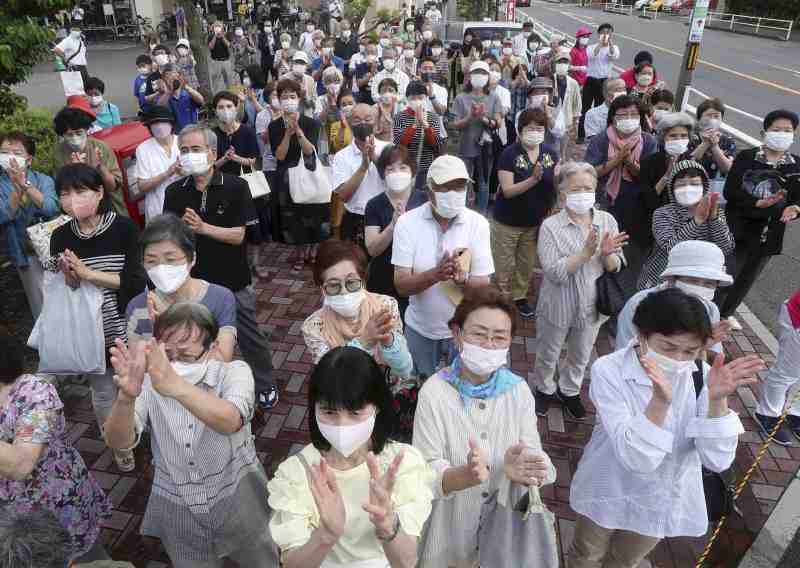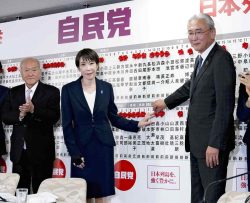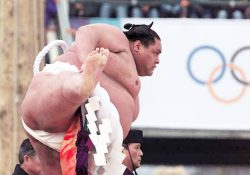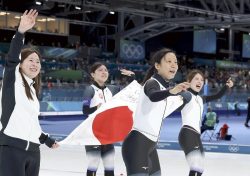
People listen to a candidate in the House of Councillors election giving a speech in Kiyosu, Aichi Prefecture, on Wednesday.
6:00 JST, June 24, 2022
The numbers 56, 63, 32 and 82 will be the keys to determining success or defeat in next month’s House of Councillors election.
The July 10 election will significantly shape Prime Minister Fumio Kishida’s handling of his administration. Among the most closely watched figures will be the results in constituencies with one seat available — races into which the ruling and opposition parties are pouring huge resources — and the number of seats won by parties supportive of constitutional revision.
56 seats or 63 seats
Constitutional revision was among topics Kishida discussed during a speech in Fukushima Prefecture on Wednesday, along with steps to counter rising prices caused by Russia’s invasion of Ukraine, the weakening yen and other factors.
“Political stability is necessary to overcome these challenges,” Kishida said as he sought support in the upcoming election.
The total number of upper house seats will increase by three to 248 after the July election. Holding a majority of at least 125 seats would enable the ruling parties to continue their stable management of Diet affairs. Kishida announced that securing a majority in the upper house, “including seats not being contested in this election,” would constitute victory in his eyes. Given that Kishida’s Liberal Democratic Party and its coalition partner Komeito have a combined 69 seats that are not up for grabs, picking up 56 of the 125 seats being contested would be enough to reach that goal.
Komeito bagged 14 contested seats in the previous upper house election. If Komeito achieves a similar result next month, the coalition could still reach Kishida’s target even if the LDP loses 10 of the 55 currently contested seats it now holds.
Many LDP members have been scratching their heads over Kishida’s cautious definition of victory, especially at a time when his Cabinet is basking in solid approval ratings in public opinion polls. “That target is too low,” a midranking LDP member said. However, Kishida, known for a circumspect temperament, remains wary of setting more ambitious goals. “The situation doesn’t warrant any optimism,” he said in an interview with The Yomiuri Shimbun on Monday.
Strong concerns are also evident among government officials. “Any blunders in the handling of rising prices might cause public discontent to grow and could quickly become a headwind for the administration,” a close aide to the prime minister said.
Some senior LDP officials consider it a goal to secure a majority among the contested seats — or 63 of these seats. While the ruling parties are aiming to reach that figure together, the LDP could also hit this mark singlehandedly depending on how the election pans out.
“I hope we, the ruling parties, amass as many seats as we can, including winning a majority of the contested seats,” LDP Secretary General Toshimitsu Motegi said to The Yomiuri Shimbun and other media outlets in an interview Monday.
The LDP would need to win 70 seats to hold a majority of the house on its own. The hurdles to achieving that are high: The most seats the LDP has ever won in an upper house election was 74 (including two seats won by candidates who joined the party after the election) in 1986 — a poll held on the same day as a House of Representatives election.
32 single-seat races
The 32 constituencies with one seat being contested could have a major bearing on the overall result of the election. Unlike multiple-seat constituencies that are often split by ruling and opposition parties, single-seat constituencies offer a clear-cut winner and loser.
The LDP suffered a crushing defeat in the single-seat constituencies contested in the 2007 upper house election held during the first Cabinet of then Prime Minister Shinzo Abe, winning just six and losing 23. The party clinched just 37 seats overall, and Abe stepped down about two months later.
In the 2013 upper house election, the LDP triumphed in 29 constituencies and tasted defeat in only two. The party secured 65 seats overall, a convincing result that provided stable foundations for the administration of the second Abe Cabinet.
In the 2016 and 2019 upper house election, the opposition parties arranged to field a single candidate in all constituencies in which one seat was in contention, to improve their chances of toppling the LDP candidate. This strategy paid off to some extent, with the opposition bloc netting 11 wins in 2016 and 10 wins in 2019.
This time, however, the opposition camp has arranged to field a single candidate in just 11 constituencies. Two opposition party candidates are running in 11 constituencies including Shiga and Gifu, three are running in nine constituencies including Akita and Miyazaki, and four have thrown their hats in the ring in Kagawa. The election terrain has changed completely.
Several factors are behind the withering of cooperation among opposition parties. The Constitutional Democratic Party of Japan has kept the Japanese Communist Party at arm’s length since suffering defeat in last year’s lower house election, and the JCP and Nippon Ishin no Kai (Japan Innovation Party) have actively backed their own candidates in a bid to chalk up more votes in the proportional representation segment of the election.
The CDPJ shed many seats in the lower house election as a result of its cooperation with the JCP, a party with which it had little in common on issues such as security policy and its vision of the state. Consequently, the CDPJ shelved its agreement with the JCP for “limited cooperation from outside the cabinet” if a change of government occurred. This riled the JCP, which has since put up candidates in 20 single-seat constituencies — including 10 in which a CDPJ candidate also is running.
The flurry of opposition candidates jumping into the single-seat constituency races could play into the LDP’s hands. “This will be a tough fight,” a grim-faced CDPJ senior official said to The Yomiuri Shimbun.
82 to revise top law
Another focus in the election is whether parties positive toward constitutional revision — an effort Kishida supports — can nail down a two-thirds majority, or 166 of the 248 upper house seats.
A two-thirds majority is required in both chambers of the Diet to initiate a public referendum on constitutional amendments. Pro-amendment forces in the lower house account for more than two-thirds of the 465 seats in that chamber.
Eighty-four of the upper house members whose seats are not being contested this time are in favor of constitutional revision. These lawmakers are from four pro-revision parties — the LDP, Komeito, Ishin and the Democratic Party for the People (DPFP) — and also include Seiko Hashimoto, who is not affiliated with any party. Reaching the two-thirds threshold will require securing 82 seats in the upcoming election.
The constitution commissions of both Diet houses had previously had few opportunities to hold discussions. But during the ordinary Diet session that finished on June 15, these commissions held discussions about once a week. This created an environment conducive to active discussions between members of the ruling and opposition parties on topics including war-renouncing Article 9 and a clause that would give the Cabinet more powers in an emergency.
Discussions on the nation’s supreme law could progress even further depending on the result of next month’s election.
Top Articles in Politics
-

LDP Wins Historic Landslide Victory
-

LDP Wins Landslide Victory, Secures Single-party Majority; Ruling Coalition with JIP Poised to Secure Over 300 seats (UPDATE 1)
-

CRA Leadership Election Will Center on Party Rebuilding; Lower House Defeat Leaves Divisions among Former CDPJ, Komeito Members
-

Japan Tourism Agency Calls for Strengthening Measures Against Overtourism
-

Voters Using AI to Choose Candidates in Japan’s Upcoming General Election; ChatGPT, Other AI Services Found Providing Incorrect Information
JN ACCESS RANKING
-

Japan Institute to Use Domestic Commercial Optical Lattice Clock to Set Japan Standard Time
-

Israeli Ambassador to Japan Speaks about Japan’s Role in the Reconstruction of Gaza
-

Man Infected with Measles May Have Come in Contact with Many People in Tokyo, Went to Store, Restaurant Around When Symptoms Emerged
-

Prudential Life Insurance Plans to Fully Compensate for Damages Caused by Fraudulent Actions Without Waiting for Third-Party Committee Review
-

Woman with Measles Visited Hospital in Tokyo Multiple Times Before Being Diagnosed with Disease


























